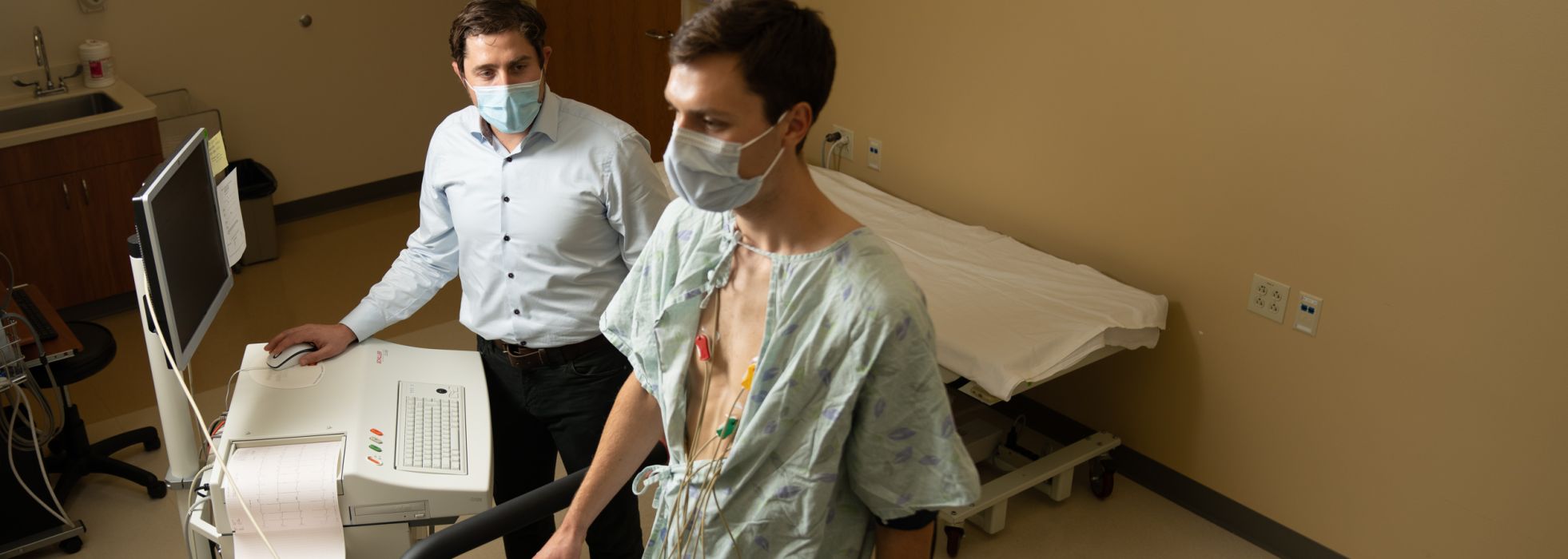Improving Cardiovascular Health in Older Adults
Adam D. Gepner, MD, is a VA-funded physician-scientist with expertise in advanced imaging of the cardiovascular system with a focus on understanding and improving cardiovascular health in older adults.
His research is translational and clinical and uses novel non-invasive techniques to diagnose and personalize treatment plans for common cardiovascular conditions that impact millions of older adults.

Personalizing Hypertension Care
Hypertension is a major modifiable risk factor that is diagnosed in nearly half of US adults. In the VA health system, one-third of Veterans have a diagnosis of hypertension and up to 70 percent of those patients have suboptimal blood pressure control. Hypertension is closely linked with arterial stiffness and can lead to the development of functional limitations and major adverse cardiovascular events, including heart failure.
Dr. Gepner and his team are actively pursuing novel non-invasive diagnostic tests to personalize hypertension care and more readily and rapidly diagnose heart failure with preserved ejection fraction (HFpEF) in older individuals who are at the highest risk for CVD events.
His team is challenging the existing dogma that blood pressure and diastolic function parameters are best measured at rest and applying these principles to easily and non-invasively improve diagnosis, treatment goals, and quality of life in an older at-risk population.
New Technique for Assessing Arterial Stiffness
Dr. Gepner was a 2024 Wisconsin Alumni Research Foundation Innovation Award Finalist for a new technique for assessing arterial stiffness. The invention may help clinicians tailor treatment plans and reduce overall cardiovascular risk for patients with hypertension.
Research Team
- Amy Hein, MS, lab manager
- Ryan J. Pewowaruk, PhD
- Molly Cole, MD
- Jeremy Williams, MD
- Justyn Nguyen, MD
- Palwinder (Paul) Sodhi, MD
- Akinwale Iyeku, MD
- Sakar Gupta, BS
- Lydia Loessin

We are actively seeking Research Associate (post-doctoral) candidates with a background in Biomedical Engineering, Physiology, Kinesiology or a closely related field.
If you are interested in joining our team, please send your CV and a brief description of your research experience and interests to Dr. Gepner.
Active Projects
- Assessing Functional Arterial Stiffness in Older Veterans (FAST VETs) Study
Many older Veterans have suboptimally controlled blood pressure (BP), in part because of inconsistent guideline recommendations for BP treatment goals and fear of side effects from pharmacotherapy. We are evaluating a non-invasive arterial stress test that evaluates dynamic arterial stiffness in older hypertensive Veterans could determine who will better tolerate more aggressive BP goals, minimizing CVD events with fewer adverse side effects.
- Assessing Heart Failure With a Simplified Non-Invasive Assessment (SIMPLIFY) Study
Reliable, rapid, clinic-based diagnostic tools to assess shortness of breath due to heart failure with preserved ejection fraction (HFpEF) are not readily available for use in an office setting. We are testing a simple novel, non-invasive method of differentiating HFpEF from non-cardiac deconditioning using a passive leg raise to rapidly assess shortness of breath in a clinic or office setting.
- Load-Dependent Arterial Stiffness to Optimize Blood Pressure Management (LOADED-BP) Study
Hypertension is a common and treatable disorder that remains the leading preventable cause of cardiovascular disease. Blood pressure treatment relies mainly on brachial blood pressure readings and ignores arterial stiffness physiology and the underlying genetic information. Older Veterans with hypertension are less likely to be treated to goal blood pressure because there are conflicting recommendations for what constitutes “optimal” in this group. We have developed a novel way to assess the component of arterial stiffness that is related to blood pressure (load-dependent stiffness). This project will generate new knowledge about how different blood pressure treatment goals (intensive vs standard) impact different components of arterial stiffness and if these differences can be explained through DNA analysis. Results from this project will offer the VA a blueprint for personalizing blood pressure care in older adults, ultimately improving cardiovascular health.
- Improving Functional Arterial Stiffness with Supervised Exercise (FAST-Exercise) Study
Arterial stiffness can be divided into two distinct mechanistic components: 1) structural stiffening due to intrinsic changes to the artery wall composition, and 2) load-dependent arterial stiffness due to elevated blood pressure. There is significant heterogeneity in how much total stiffness is due to load-dependent stiffness or structural stiffness. This study hopes to determine if the individual mechanistic components of arterial stiffness can be improved with regular supervised exercise in older adults.
Funding Support
Dr. Gepner is funded by a VA Clinical Science Career Development Award and a VA Clinical Science MERIT Award.

